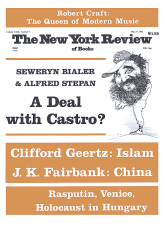In response to:
Farewell to the Family? from the March 18, 1982 issue
To the Editors:
I was delighted to see my book, Friends as Family, included among the works reviewed by Andrew Hacker in your March 18 issue. I was disturbed, however, that Mr. Hacker characterized my book as “a proposal for the single life.” It’s true that of the thirty-eight people interviewed in the book, more are single than married (twenty-four are single, fourteen married). It’s easier to find single people who are consciously creating family with their friends. But the book is not a call for either marriage or nonmarriage. It is an exploration of, and, yes, advocacy for, expanding definitions of family beyond blood and marriage kinship. The married people I interviewed did this as enthusiastically as did the single people. None of them, married or single, saw marriage and friendship families as mutually exclusive; many of the single people are young men and women who plan, or hope, to marry and have children. And nearly all of the single people, like all of the married people, number married and unmarried friends among their chosen families.
I’m also puzzled by Mr. Hacker’s assertion that I “skirt the question of children.” I certainly haven’t addressed the issue of whether or not to have children, since that isn’t what the book is about. Again, fourteen of my interviewees were parents. More important, in terms of what the book is about, many of the people had major relationships with children not related to them by blood: this was true of parents and nonparents alike. The children were never seen as substitutes for people’s “own” children, although one woman in her mid-thirties who still hoped to marry and have children told me she felt less desperate about it, knowing that whatever happened in her life, she still had a major relationship with a child.
My objection to the institutions of marriage and parenthood is their exclusivity—not in the sense of sexual monogamy, but in terms of deep, primary, committed relationships. This exclusivity has been entrapping for both married and unmarried, parent and nonparent. Remaining single is no more a solution than getting married. What is crucial is that, along with the decision to marry or not to marry, to have or not to have children, we also allow ourselves the choice of deep, primary, familial friendships with adults and children.
Karen Lindsey
Somerville, Massachusetts
This Issue
May 27, 1982



